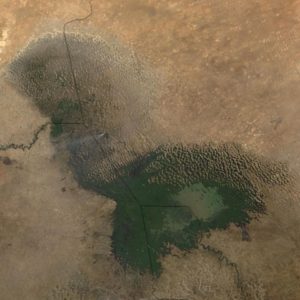The Stream, June 27: Dry Reservoirs Create Water Shortages In Chennai, India
The Global Rundown
The city of Chennai, India is facing an acute drinking water shortage after a severe drought dried up the city’s main reservoirs. The controversial delta tunnel water project in California gained two key federal approvals. The rate of global sea level rise is increasing, scientists found. The world’s lakes, rivers, and wetlands are producing more food than previously thought, a new study suggests. Tanzania is moving forward with the Stiegler’s Gorge hydropower dam, which opponents say will harm a massive game reserve. Cape Town, South Africa plans to implement stronger water restrictions even as rains bring some relief from a drought. State and federal officials are split over the emergency pumping of floodwaters in South Florida.
“It’s an emergency in the Everglades. If we don’t pull this trigger, there may be nothing left to save.” –Ron Bergeron, commissioner for the Florida Fish and Wildlife Conservation Commission, on the emergency pumping of floodwaters north into Lake Okeechobee instead of south into the Everglades. Critics of the pumping say it is reversing the natural flow of water and could increase pollution in the lake and connected estuaries, while proponents say allowing the floodwaters to move into the Everglades could threaten endangered birds that are currently nesting there. (Sun Sentinel)
In context: Toxic algae flourish as Everglades solution eludes Florida.
By The Numbers
1/2 of the water supply for Chennai, India has been cut by the city’s worst drought in 140 years. Officials say the city’s four primary reservoirs have dried up, necessitating the deployment of hundreds of water tankers. NDTV
In context: In city prone to drought, Chennai’s water packagers rush in.
2,100 megawatts Electrical generating capacity that will be provided by the proposed Stiegler’s Gorge dam in Tanzania. The country’s president announced that the dam will move forward, despite opposition from conservationists who say it will harm the Selous game reserve. Guardian
500 million liters per day New water usage target set to come into effect in Cape Town, South Africa after the city puts in place stricter conservation measures. Despite some rain, city officials warn that it could take years to revive reservoirs that have been diminished by drought. News 24
In context: To avoid drought calamity, Cape Town restricts water use.
Science, Studies, And Reports
Global sea levels rose at a rate of 3.3 millimeters per year in 2014, much faster than the 2.2 millimeters per year recorded in 1993, according to a study published in the journal Nature Climate Change. Scientists found that much of the increase can be attributed to the melting of the Greenland ice sheet, which accounted for a quarter of sea level rise in 2014 compared to 5 percent in 1993. Reuters
Global inland fisheries likely produce much more food each year than previously estimated, according to a study by researchers at Michigan State University and the U.S. Geological Survey. The study only analyzed 53 percent of the world’s lake surface area and did not include wetlands, rivers or other inland waterways. Yet those lakes alone accounted for 79 percent of the total amount of inland fish harvested globally, suggesting that harvests are under-reported. USGS
On The Radar
Two federal U.S. agencies — the National Marine Fisheries Service and the U.S. Fish and Wildlife Service — approved a plan in California to build two major water tunnels in the Sacramento-San Joaquin Delta, saying they are not likely to endanger the existence of protected species or habitat. The project has been strongly opposed by conservationists who worry about its effect on native fish. The tunnels still require other state and federal approvals. Associated Press
A news correspondent for Circle of Blue based out of Hawaii. She writes The Stream, Circle of Blue’s daily digest of international water news trends. Her interests include food security, ecology and the Great Lakes.
Contact Codi Kozacek





